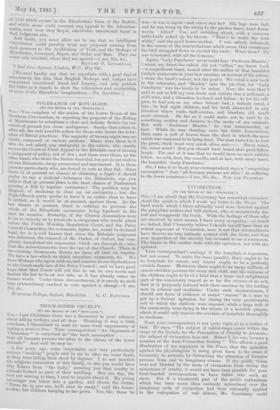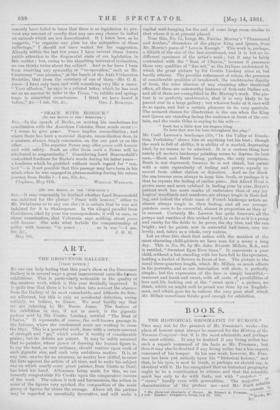VIVISECTION.
[TO TLIBI EDITOR OF TRH " SPECTATOR."1
am afraid that Mr. Courtenay has somewhat misuuder- stood the spirit in which I wrote my letter to the Times. The hard words which I there advisedly used were directed against the pamphlet-writers and bill-stickers, who so monstrously dis- tort and exaggerate the truth. With the feelings of those who are deceived by such means, I have every sympathy,—so much so, indeed, that I honestly believe I should myself have been an ardent opponent of Vivisection, were it not that circumstances have thrown me into intimate contact with the facts, and that near inspection of the atrocity has revealed to me a scarecrow. The blame in this matter rests with the agitators, not with the agitated.
Your correspondent's analogy of the hospitals is ingenious, but not sound. To make the cases parallel, there ought to be no hospitals for cancer, and cancer ought to be a perfectly curable disease. Moreover, there ought to be many millions of cancer-stricken persons for every sick child, and the sickness of the children ought to be of a kind that a large and enlightened part of the community regard as so far the reverse of an evil, that it is purposely induced with their sanction by the leading men in science and medicine. 'Under such circumstances, I should not deem it evidence of sound " reason " in a man to get up a furious agitation for curing the very questionable evil to which the children were exposed, while a large bulk of the community were dying in the streets of a horrible plague, which it would only require the erection of hospitals thoroughly to eradicate.
Next, your correspondent is not quite right as to a matter of fact. He says, "The subject of rabbit-traps conies within the scope of the Society for the Prevention of Cruelty to Animals ; the subject of vivisection does not. Hence I, for one, became a member of the Anti-Vivisection Society." This affords a good illustration of my argument in the Times, that the agitation against the physiologists is doing great harm to the cause of humanity to animals, by distracting the attention of humane persons from real to imaginary abuses. If the public vision were not blinded by the mote of vivisection from seeing the mountains of cruelty, it would not have been possible for your kind-hearted correspondent to have fallen into such an error. For if a hundredth part of the public enthusiasm which has been worse than uselessly squandered. over the imaginary evils of vivisection had been rationally applied to the extirpation of real abuses, Mr. Courtenay could.
scarcely have failed to learn that there is no legislation to pre- vent any amount of cruelty that any one may choose to inflict on animals which are not domesticated.. If I knew how, as he suggests, "to organise any plan for the mitigation of these sufferings," I should not have waited for his suggestion. Already within the last few years I have several times drawn public attention to the disgraceful state of our legislation in this matter ; but, owing to the absorbing interest of vivisection, no one thinks twice about the subject. And so far have I been from receiving any sympathy or " co-operation," such as Mr. Courtenay " can promise," at the hands of the Anti-Vivisection Societies, that from the secretary of one of them—Mr. G. R. Jesse—I have only been met with something very like a sneer. " Your allusion," he says in a printed letter, which he has sent me as an answer to mine in the Times, "to rabbits and spring- traps is somewhat monotonous. I think we have heard it







































 Previous page
Previous page